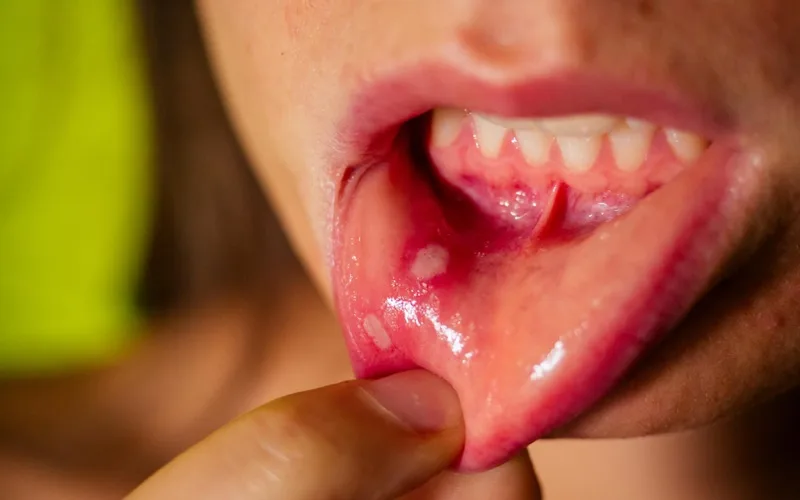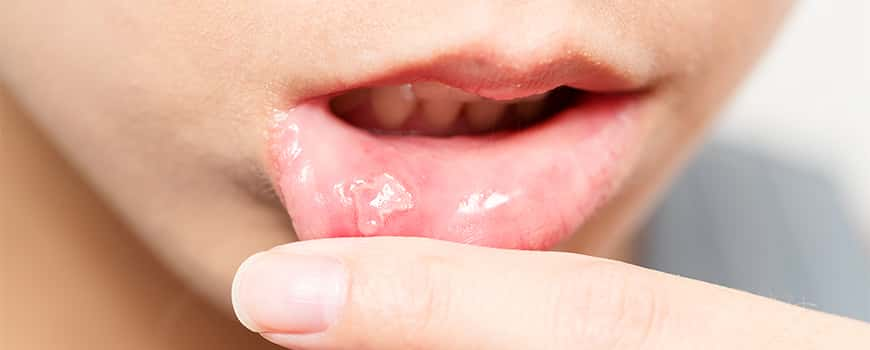Things to Know Canker Sores and Mouth Wounds
Salih ÖNDER2025-04-02T03:35:22+03:00Table of Contents
ToggleWhat Are Canker Sores (Aphthous Ulcers)?
Canker sores, also known as aphthous ulcers, are small, shallow lesions that develop on the soft tissues inside the mouth. These painful sores are typically round or oval with a white or yellow center surrounded by a red border. Unlike cold sores, which appear on the lips and are caused by the herpes virus, canker sores are not contagious and occur only inside the mouth.
They can form on the inside of the cheeks, lips, tongue, the base of the gums, or even the roof of the mouth. While they are usually harmless and tend to heal on their own, recurring or severe canker sores can interfere with eating, speaking, and overall comfort.
Causes and Risk Factors of Canker Sores
The exact cause of canker sores is not fully understood, but a combination of factors can contribute to their development. These include:
Minor injuries inside the mouth (e.g., from dental work, aggressive brushing, or accidental biting)
Stress and fatigue
Nutritional deficiencies, especially in vitamin B12, zinc, iron, or folate
Hormonal changes, such as those during menstruation
Food sensitivities, particularly to acidic or spicy foods
Medical conditions such as celiac disease, Crohn’s disease, or a weakened immune system
Some people may also be genetically predisposed to developing canker sores, especially if they have a family history of frequent outbreaks.
Common Symptoms of Aphthous Ulcers
Canker sores are usually easy to identify due to their appearance and accompanying discomfort. The most common symptoms include:
A burning or tingling sensation before the sore appears
A round or oval-shaped lesion with a white or yellow center
A red, inflamed border surrounding the sore
Pain or discomfort, especially when eating, drinking, or talking
In more severe cases, canker sores may be accompanied by fever, fatigue, or swollen lymph nodes, particularly if there are multiple ulcers present.
Are Canker Sores Contagious?

No, canker sores are not contagious. Unlike cold sores, which are caused by the herpes simplex virus and can be spread through direct contact, canker sores do not result from viral infections. They are not transmissible through kissing, sharing utensils, or any other form of close contact.
Because they are not contagious, there’s no need to isolate or take extra precautions around others. However, proper oral hygiene is still important to avoid irritation and secondary infections.
How Long Do Canker Sores Last?
The healing time for canker sores varies depending on the size and severity of the ulcer. Most minor sores will begin to heal within 3 to 4 days and completely disappear within 1 to 2 weeks without leaving a scar.
Larger or more painful sores may take longer to heal and could require medical attention. If a canker sore persists for more than two weeks, or if it recurs frequently, it’s a good idea to consult a healthcare provider to rule out any underlying conditions or deficiencies.
Effective Home Remedies for Canker Sores
Many cases of canker sores can be managed at home using simple remedies that reduce discomfort and promote healing. While these methods don’t cure the sores instantly, they can make the symptoms more bearable and speed up recovery.
Popular home remedies include:
Salt Water Rinse
Mix a teaspoon of salt in a glass of warm water and swish it around the mouth several times a day to clean the area and reduce inflammation.
Baking Soda Rinse
A baking soda rinse can help neutralize acids in the mouth and soothe irritation.
Hydrogen Peroxide
When diluted with water, hydrogen peroxide can be dabbed on the sore with a cotton swab to disinfect the area.
Honey
Applying honey directly to the sore may reduce pain and aid healing due to its natural antibacterial properties.
Ice Chips
Sucking on ice can help numb the area and reduce swelling.
It’s also important to avoid spicy, acidic, or abrasive foods that can make the sore worse while it heals.
Medical Treatments for Aphthous Ulcers
For people with severe, persistent, or frequently recurring canker sores, professional treatment may be necessary. Dentists or doctors can provide solutions to reduce symptoms and speed up recovery.
Medical treatments may include:
Topical Medications
These include gels or ointments containing corticosteroids or antiseptics to reduce pain and inflammation.
Oral Rinses
Prescription mouthwashes with anti-inflammatory or numbing agents are often used for multiple or severe ulcers.
Systemic Medications
In rare cases, oral medications such as immunosuppressants may be prescribed, especially for patients with underlying autoimmune conditions.
Cauterization
This involves using a chemical or laser to burn the ulcer and speed healing. It’s a quick and typically painless procedure done in a dental or medical office.
If canker sores interfere with daily life or do not respond to basic care, seeking professional help is recommended.
When Should You See a Doctor for Canker Sores?

While most canker sores are harmless and heal on their own, there are certain situations where a visit to the doctor or dentist is advised:
The sore is unusually large or painful
It doesn’t heal within two weeks
Sores recur frequently and disrupt daily life
There are signs of infection, such as pus or spreading redness
You experience difficulty eating or drinking due to the pain
You develop sores along with a high fever or extreme fatigue
Persistent or recurring canker sores could be a symptom of an underlying health condition that requires diagnosis and treatment.
For your information –> Dental Implants Turkey
How to Prevent Canker Sores Naturally
Although canker sores can’t always be prevented, adopting certain habits may reduce their frequency and severity. Preventive measures include:
Maintaining Good Oral Hygiene
Brushing gently with a soft-bristled toothbrush and using a mild toothpaste can help avoid trauma to mouth tissues.
Avoiding Irritating Foods
Limiting spicy, acidic, or crunchy foods can reduce irritation that may trigger sores.
Managing Stress
Stress is a known trigger for many people, so relaxation techniques such as deep breathing, yoga, or meditation may help.
Staying Nutritionally Balanced
Ensuring adequate intake of essential nutrients like vitamin B12, folate, and iron can prevent deficiencies linked to canker sores.
Protecting the Mouth from Injury
Using a mouthguard during sports and being cautious while eating can prevent accidental bites or irritation.
Small lifestyle changes can go a long way in keeping your mouth ulcer-free and reducing the discomfort caused by canker sores.
Click and learn –> Antalya Dental Clinic
The Link Between Canker Sores and Systemic Diseases
In some cases, recurring canker sores may be linked to systemic health problems. Conditions such as celiac disease, Crohn’s disease, and Behçet’s disease are known to have oral symptoms, including frequent aphthous ulcers.
These systemic conditions can affect the immune system or cause chronic inflammation, making the soft tissues in the mouth more vulnerable. Additionally, deficiencies in iron, vitamin B12, or folic acid—often caused by malabsorption disorders—can lead to repeated outbreaks of canker sores.
If you experience chronic or unusually severe canker sores, a medical evaluation may help uncover a more serious underlying cause. Treating the root issue often leads to fewer or milder oral ulcers over time.
It might interest you –> Hollywood Smile Turkey

